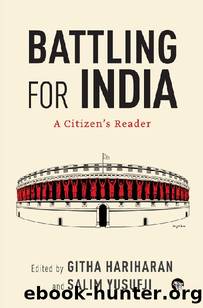Battling for India: A Citizenâs Reader by Githa Hariharan & Salim Yusufji

Author:Githa Hariharan & Salim Yusufji [Hariharan, Githa & Yusufji, Salim]
Language: eng
Format: epub
Published: 2019-03-10T00:00:00+00:00
First published in Indian Cultural Forum, October 24, 2015
A SYMBOLIC MORAL GESTURE
K.P. Ramanunni
Malayalam writer K.P. Ramanunniâs first novel Sufi Paranja Katha (What the Sufi Said) dealt with an inter-faith marriage and the subsequent dialogue between a convertâs past and present, amid the tug of divergent loyalties. In 1995, it was awarded the Kerala Sahitya Akademi Award. His fourth novel, Daivathinte Pusthakam (Godâs Own Book) won the Kendra Sahitya Akademi Award in 2017. Ramanunni, who once fasted in solidarity with Irom Sharmila, now used his award to reawaken the public conscience after the murder of the teenager Junaid Khan. What follows is his statement after receiving the Sahitya Akademi Award on February 16, 2018.
Dear Friends,
After accepting the Sahitya Akademi Award I now come in your midst in order to make a symbolic, moral gesture. Let me explain briefly. The book that earned me this award is Godâs Own Book which is, so to speak, my extra grief at the present plight of the world and humanity, and a writerâs imaginative struggle to renovate them.
But beyond this, in the present Indian situation, Godâs Own Book (Daivathinte Pustakam) carries out an enormous political mission as well, And that is to uphold the love of other religions cherished by true Hinduism, to build a conceptual foundation for religious amity, to put up a bulwark against the countryâs catastrophic slide into communal ruin, Daivathinte Pusthakam is a book where the Prophet Muhammad Nabi, calls Krishnan âikkaâ (elder brother) and Krishnan affectionately calls the Prophet âmutheâ (precious dear). They are presented as if they are brothers. Both Krishnan and Nabi, who share a number of personality traits, who go through lifeâs predicaments that are similar, do not ask their followers to engage in conflicts but to live in love and harmony.
Since this is the message that the novel presents, I have the obligation to disseminate it on the occasion of the Award function too, that is why I shall now take only three rupees from the award amount, and leave the rest to Junaidâs mother (Ammi). Junaid is one who was killed by Hindu communalists just for being a Muslim. Let me place this award amount as an offering at the feet of Junaidâs mother, thus doing penance for that wicked sin, for penance is a special observance in the true Hindu tradition. Yes, I am a true Hindu, l am a true Hindu.
I hope our great Indiaâs literary world endorse this humble gesture.
What was the incident?
On June 22, 2017, Junaid Khan, a fifteen-year-old boy, and his brothers and cousin, were returning to their village in Haryana after a day-trip to Delhi to shop for Eid, when a murderous mob turned on them. The crowd shouted communal abuses at the Muslim men, also yelling they were âanti-nationalsâ. Junaidâs brother Haseebâs cap was pulled off his head and his beard was grabbed and pulled because they looked âdifferentâ. Finally, Junaid was stabbed to death, and his body was later thrown off the train at a railway station just 30 kms from New Delhi.
Download
This site does not store any files on its server. We only index and link to content provided by other sites. Please contact the content providers to delete copyright contents if any and email us, we'll remove relevant links or contents immediately.
What's Done in Darkness by Kayla Perrin(25501)
Shot Through the Heart: DI Grace Fisher 2 by Isabelle Grey(18220)
Shot Through the Heart by Mercy Celeste(18160)
The Fifty Shades Trilogy & Grey by E L James(17777)
The 3rd Cycle of the Betrayed Series Collection: Extremely Controversial Historical Thrillers (Betrayed Series Boxed set) by McCray Carolyn(13189)
The Subtle Art of Not Giving a F*ck by Mark Manson(12915)
Scorched Earth by Nick Kyme(11833)
Stepbrother Stories 2 - 21 Taboo Story Collection (Brother Sister Stepbrother Stepsister Taboo Pseudo Incest Family Virgin Creampie Pregnant Forced Pregnancy Breeding) by Roxi Harding(11040)
Drei Generationen auf dem Jakobsweg by Stein Pia(10217)
Suna by Ziefle Pia(10186)
Scythe by Neal Shusterman(9263)
International Relations from the Global South; Worlds of Difference; First Edition by Arlene B. Tickner & Karen Smith(8613)
Successful Proposal Strategies for Small Businesses: Using Knowledge Management ot Win Govenment, Private Sector, and International Contracts 3rd Edition by Robert Frey(8419)
This is Going to Hurt by Adam Kay(7698)
Dirty Filthy Fix: A Fixed Trilogy Novella by Laurelin Paige(6454)
He Loves Me...KNOT by RC Boldt(5805)
How to Make Love to a Negro Without Getting Tired by Dany LaFerrière(5378)
Interdimensional Brothel by F4U(5305)
Thankful For Her by Alexa Riley(5163)
